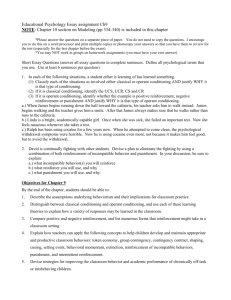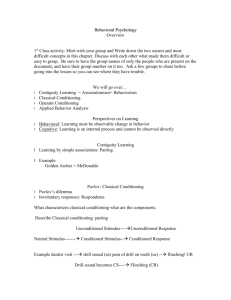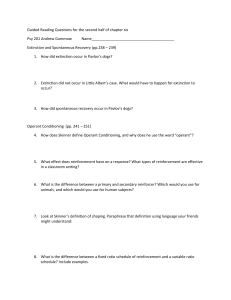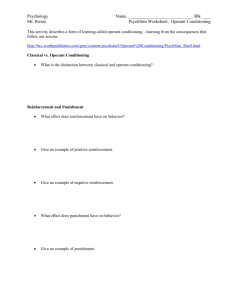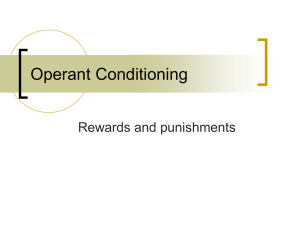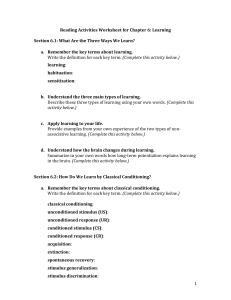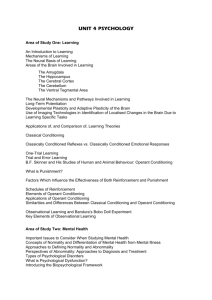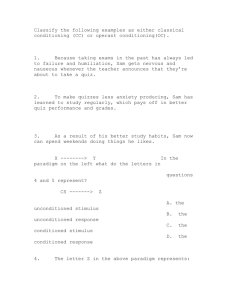Elementary Psychology 31:001 Fall 2014 -
advertisement
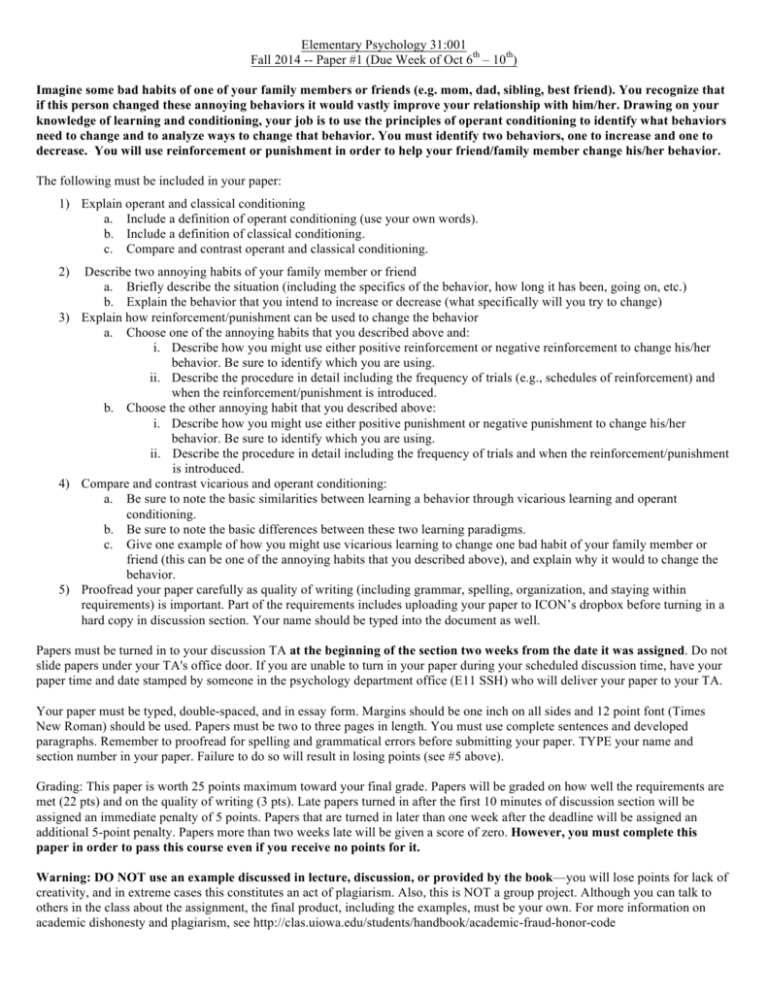
Elementary Psychology 31:001 Fall 2014 -- Paper #1 (Due Week of Oct 6th – 10th) Imagine some bad habits of one of your family members or friends (e.g. mom, dad, sibling, best friend). You recognize that if this person changed these annoying behaviors it would vastly improve your relationship with him/her. Drawing on your knowledge of learning and conditioning, your job is to use the principles of operant conditioning to identify what behaviors need to change and to analyze ways to change that behavior. You must identify two behaviors, one to increase and one to decrease. You will use reinforcement or punishment in order to help your friend/family member change his/her behavior. The following must be included in your paper: 1) Explain operant and classical conditioning a. Include a definition of operant conditioning (use your own words). b. Include a definition of classical conditioning. c. Compare and contrast operant and classical conditioning. 2) Describe two annoying habits of your family member or friend a. Briefly describe the situation (including the specifics of the behavior, how long it has been, going on, etc.) b. Explain the behavior that you intend to increase or decrease (what specifically will you try to change) 3) Explain how reinforcement/punishment can be used to change the behavior a. Choose one of the annoying habits that you described above and: i. Describe how you might use either positive reinforcement or negative reinforcement to change his/her behavior. Be sure to identify which you are using. ii. Describe the procedure in detail including the frequency of trials (e.g., schedules of reinforcement) and when the reinforcement/punishment is introduced. b. Choose the other annoying habit that you described above: i. Describe how you might use either positive punishment or negative punishment to change his/her behavior. Be sure to identify which you are using. ii. Describe the procedure in detail including the frequency of trials and when the reinforcement/punishment is introduced. 4) Compare and contrast vicarious and operant conditioning: a. Be sure to note the basic similarities between learning a behavior through vicarious learning and operant conditioning. b. Be sure to note the basic differences between these two learning paradigms. c. Give one example of how you might use vicarious learning to change one bad habit of your family member or friend (this can be one of the annoying habits that you described above), and explain why it would to change the behavior. 5) Proofread your paper carefully as quality of writing (including grammar, spelling, organization, and staying within requirements) is important. Part of the requirements includes uploading your paper to ICON’s dropbox before turning in a hard copy in discussion section. Your name should be typed into the document as well. Papers must be turned in to your discussion TA at the beginning of the section two weeks from the date it was assigned. Do not slide papers under your TA's office door. If you are unable to turn in your paper during your scheduled discussion time, have your paper time and date stamped by someone in the psychology department office (E11 SSH) who will deliver your paper to your TA. Your paper must be typed, double-spaced, and in essay form. Margins should be one inch on all sides and 12 point font (Times New Roman) should be used. Papers must be two to three pages in length. You must use complete sentences and developed paragraphs. Remember to proofread for spelling and grammatical errors before submitting your paper. TYPE your name and section number in your paper. Failure to do so will result in losing points (see #5 above). Grading: This paper is worth 25 points maximum toward your final grade. Papers will be graded on how well the requirements are met (22 pts) and on the quality of writing (3 pts). Late papers turned in after the first 10 minutes of discussion section will be assigned an immediate penalty of 5 points. Papers that are turned in later than one week after the deadline will be assigned an additional 5-point penalty. Papers more than two weeks late will be given a score of zero. However, you must complete this paper in order to pass this course even if you receive no points for it. Warning: DO NOT use an example discussed in lecture, discussion, or provided by the book—you will lose points for lack of creativity, and in extreme cases this constitutes an act of plagiarism. Also, this is NOT a group project. Although you can talk to others in the class about the assignment, the final product, including the examples, must be your own. For more information on academic dishonesty and plagiarism, see http://clas.uiowa.edu/students/handbook/academic-fraud-honor-code



